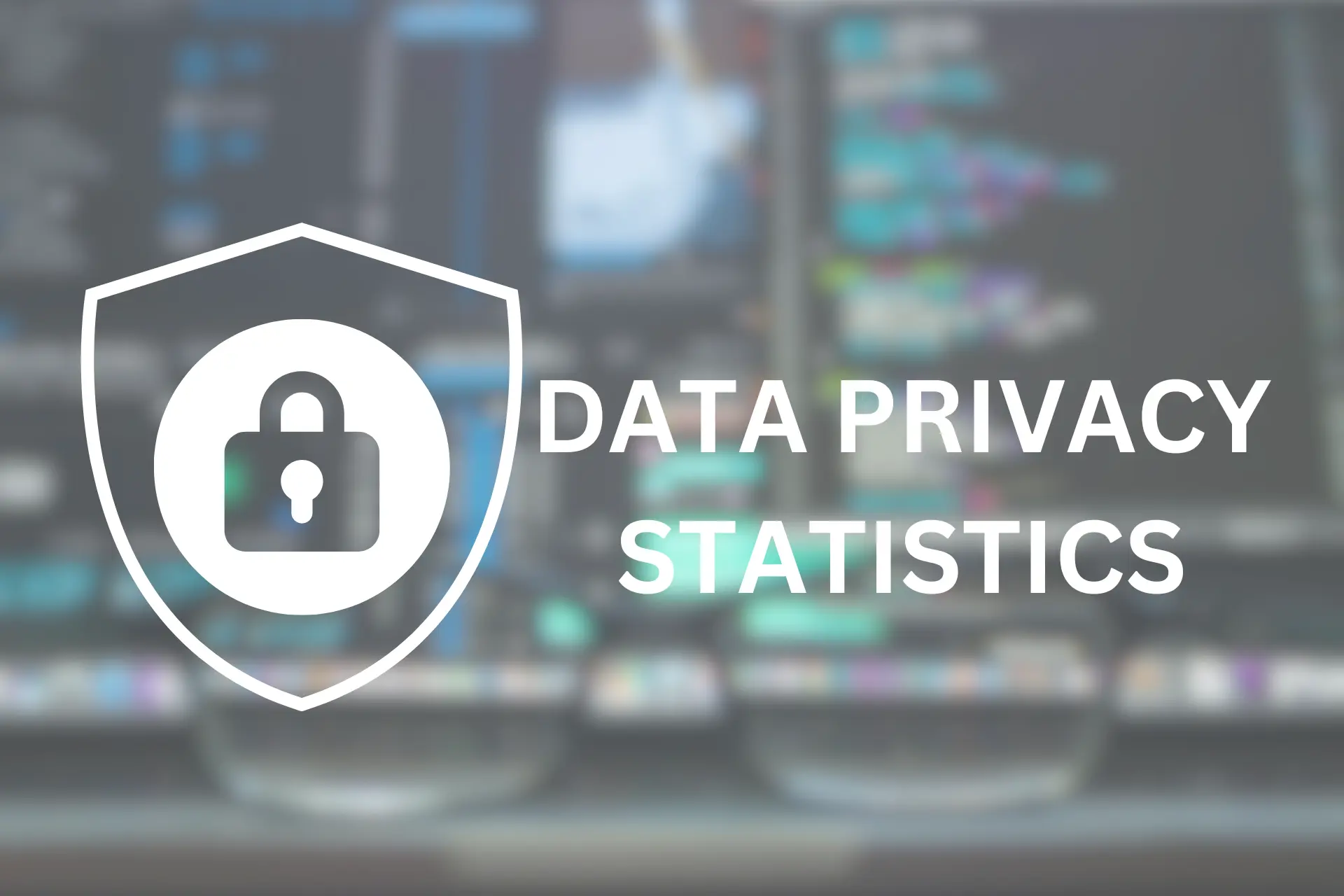12 Concerning Data Privacy Statistics to Know in 2025

Have you ever wondered how the websites, games, and social apps you visit collect and store data about you?
Data privacy is such a sensitive issue as internet users are now more conscious about how much information they expose about themselves online.
Over time, numerous data breaches and the risks attached to them make it important for every internet user to look for a way to further protect their online privacy.
That’s why this article highlights important and relevant data privacy statistics so you get insightful information that’ll help you understand your digital footprint.
Let’s dive in!
Shocking data privacy statistics
Here are some stats highlighting the data privacy trends today.
- 13% of internet users across the globe are willing to share their contact details for free content. ?
- Only 33% of the total internet users in the world change their passwords on a regular basis. ?
- On average, hackers target PCs connected to the internet every 39 seconds. ???
- Free apps are 4 times more likely to store user data than paid apps. ?
- 85% of adults around the world are interested in protecting their online privacy. ?
- About 67% of internet users in the United States don’t know their country’s data privacy and protection rules. ?
- On a daily basis, at least 1 out of 4 Americans are compelled to agree to a privacy policy. ✔️
General data privacy statistics
This section details more about internet privacy statistics and they show how people protect themselves from the many forms of security threats.
1. 63% of internet users in the US use antivirus software to secure their online privacy
(Source: Surfshark)
According to Surfshark, Ad blockers, Password managers, and Antivirus software are the top 3 tools used by various internet users to safeguard their data online.
- 39% of users use ad blockers
- 63% of internet users use antivirus software
- 36% of internet users use password managers
Also, other user statistics based on the tools used include:
- 15% use encrypted messaging apps
- 17% (1 out of 5) of users use encrypted email
- 14% are subscribed to paid VPN services.
2. 90% of internet users in the US agree with the importance of online privacy
(Source: Surfshark)
In addition, 75% of Americans believe they are prone to attacks from hackers and other cybercriminals.
At the same time, 56% think they have absolute control of their data.
3. At least 1 in 4 Americans are asked to agree to a privacy policy daily
(Source: Pew Research Center)
Lengthy privacy policies are often shown to most internet users in the US which they’re expected to accept so as to be able to use an online service.
25% claim to see these privacy policies daily, 57% come across them on a weekly basis, and 81% encounter them monthly.
However, only 22% of these users in the United States take the time to read these privacy policies.
4. Internet users between the ages of 16-24 are nonchalant about the information they divulge online.
(Source: SocialMediaStatistics)
One would think that younger adults who are more aware of the security risks present online take their privacy seriously.
However, that is far from the case as 34% of the surveyed users between the ages of 16-24 engage in activities that expose their private data online.
These activities include posting pictures, chatting with strangers, and sharing their personal contact information including their home addresses.
5. 80% of consumers in the UK don’t trust social media giants and other services when collecting their data
(Source: Consumer Digital Trust Index)
According to the results of a study, only 20% of UK consumers trust data collection services with protecting their privacy.
This makes the UK the least trusting country in the world alongside France and Australia.
Additionally, only 23% of Germans trust services with protecting their data.
On the other hand, Brazil, Mexico, and UAE are the most trusting countries.
95%, 93%, and 91% of respondents from these respective countries trust that social media and other digital services protect their privacy and data adequately.
6. 33% of global consumers have suffered a data breach
(Source: Consumer Digital Trust Index)
Furthermore, 82% of these victims of data breaches also say that it affected their lives negatively.
Sadly, 11% of the companies that exposed these consumers’ data took up to 6 months or even a year to notify them of a data breach.
7. 85% of adults across the world want more ways to protect their online privacy
(Source: Norton)
In a survey carried out on 10,000 adults in 10 countries, centered on data privacy in 2022, Norton confirms that 61% are willing to compromise their data privacy for convenience.
80% are concerned about their privacy, 69% claim to be much more concerned about their online privacy
51% are clueless about how to protect their privacy while 55% don’t believe it’s possible to fully protect their privacy.
8. A large number of Americans believe it’s impossible to avoid the government and companies collecting their data
(Source: Pew Research Center)
A survey conducted by Pew Research Center establishes the fact that 62% of their respondents believe it’s almost impossible for companies not to collect their data in their daily life.
63% are of the same impression about the government.
Furthermore, 79% are more concerned about how companies use their personal data and information.
On the other hand, 64% are concerned about how the government uses their personal data.
Mobile data privacy statistics
These digital footprint statistics show how exposed user data can be online.
9. 72.6% of iOS apps track private and sensitive user data (1.26 million apps)
(Source: 42 Matters)
Shockingly, 44% of free apps on iOS collect user data, while 10.31% of paid apps collect user data.
More baffling is the fact that 27.48% of iOS apps (about 477,000) have and use data that are directly linked to their users.
Furthermore, 16.41% (284,000) of apps on iOS have access to the user’s actual background location.
In addition, 13.08% (227,000) of iOS apps track their users with data collected.
10. 71% of countries across the world have implemented data protection laws
(Source: United Nations Conference on Trade and Development)
137 countries out of 194 have enacted data protection laws according to UNCTAD data.
This includes 61% of African countries and 57% of Asian countries.
However, 15% of countries across the world have no laws to protect data, while there is no data from 5% of countries to determine their level of awareness about data protection.
11. Food delivery apps and social media track and collect user data
(Source: Surfshark)
Food delivery and social media applications on average collect the most data of up to 20 points.
The above was the conclusion of research done on the privacy policies of over 200 apps.
Dating apps collect approximately 16 data points while shopping apps collect 18 user data points.
The least amount of user data points collected by apps are from kids’ apps, browsers, and image editors.
12. 82% of US Facebook users do not trust that the platform protects their data and privacy.
(Source: Insider Intelligence)
Facebook has 230 million US-based users, but only 45 million people (18%) actually trust the platform with their data and privacy. It’s no surprise, considering Meta is one of the companies that collects the most data to sell to data brokers.
Data privacy trends
The groundbreaking advancement in AI technology is arguably the biggest trend as of today.
Experts have predicted that it will bring with it new privacy threats which will lead to the development of new ways to protect user data.
In addition, the emergence of web3 and advancements in blockchain technology also create new ways for malicious individuals to attack others on the internet.
However, the privacy industry is already seeing a push for more solutions.
Thought leaders in the industry also feel that governments will implement and enforce new data protection laws.
The EU’s GDPR is an example of this trend, and the general feeling is that the trend will continue in the upcoming years.
Summary
Data Privacy is a sensitive issue that needs to be taken seriously.
As days go by, many internet users are more interested in protecting their privacy than ever before.
You should also take proactive steps in protecting your sensitive data and information using a premium VPN or any other privacy protection tool you prefer.
We’ve found the best VPN deals you can find online.
Sources
- Surfshark
- Pew Research Center
- Social Media Statistics
- Statista
- Consumer Digital Trust Index
- Consumer Digital Trust Index
- Aspen Digital
- Cisco Privacy Survey
- Cisco Data Privacy Benchmark Study
- United Nations Conference on Trade and Development
- Insider Intelligence
- Norton
- Pew Research Center
- 42Matters
- Data Protection
- Surfshark
- TechWireAsia
Read our disclosure page to find out how can you help VPNCentral sustain the editorial team Read more






User forum
0 messages